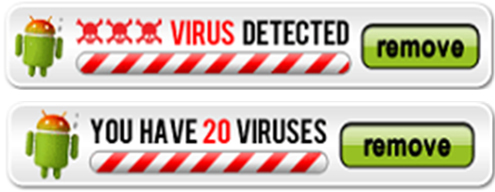Global mobile marketer Jesta Digital, LLC, will provide refunds to a large number of consumers and pay an additional $1.2 million to the Federal Trade Commission as part of a settlement with the FTC, which alleged that Jesta crammed unwanted charges onto consumers’ cell phone bills.
According to the Commission’s complaint, Jesta – which also does business as Jamster – ran phony virus-scan ads on consumers’ Android mobile devices while they played the Angry Birds mobile app. The ads falsely claimed that a virus was detected on the consumer’s mobile device. The ads incorporated an image of a robot designed to look similar to the Android operating system’s robot logo:

When consumers clicked on the ads, Jesta presented them with a series of screens or landing pages that included bold and prominent language and visuals about protecting Android mobile devices from viruses. While a screen contained a subscriber button, the FTC alleged that if consumers clicked anywhere on the screens or landing pages, Jesta charged them $9.99 per month directly on their mobile bill for ringtones and other mobile content. If consumers actually attempted to subscribe and download Jesta’s so-called anti-virus software to their mobile devices, the download often failed, according to the FTC complaint. Jesta’s internal emails quoted in the FTC’s complaint are particularly illustrative. In one email, a Jesta official was “anxious to move [Jesta’s] business out of being a scam and more into a valued service.”
Jesta charged unsuspecting consumers by misusing a novel, little-used billing method known as Wireless Access Protocol, or WAP, billing. WAP billing captures a consumer’s mobile phone number from the mobile device, which is used to place charges on their mobile phone bill without the need to obtain the information manually from the consumer.
Under the terms of the proposed settlement, Jesta is prohibited from making deceptive statements about viruses and anti-virus software, the cost of goods or services, or the conditions of a purchase. Jesta must also receive express verifiable authorization from a consumer before placing any charges on a consumer’s mobile phone bill.
Jesta is required to automatically provide full refunds to consumers who were billed between Dec. 8, 2011, and the date of entry of the order for any good or service that involved the company claiming the consumer’s device was infected with malware or that the Jesta would provide purchasers with software to protect their mobile device from malware.
For those consumers Jesta charged between Aug. 1 and Dec. 7, 2011, under short code 75555 (which includes the marketing campaign challenged in the complaint), Jesta is required to notify those consumers of their ability to obtain a refund. Consumers will have to contact Jesta at 866-856-5267 or by e-mail at [email protected] and make a refund request. Jesta is obligated to pay a refund to consumers who did not use the service offered by Jesta or where the charges were incurred by a child under the age of 18.
In addition to providing timely refunds directly to consumers, Jesta will pay $1.2 million directly to the Commission.
Consumers with questions about the case or the refund process may contact the FTC for more information at 202-326-3523.
This complaint marks the Commission’s second mobile cramming case and the first involving WAP billing and scareware brought by the Commission. Earlier this year, the FTC also held a roundtable that explored the most effective ways to protect consumers from mobile cramming.
The Commission vote authorizing the staff to file the complaint and approving the proposed stipulated final order was 4-0. The FTC filed the complaint and proposed order in the U.S. District Court for the District of Columbia. The proposed order is subject to court approval.
NOTE: The Commission files a complaint when it has “reason to believe” that the law has been or is being violated and it appears to the Commission that a proceeding is in the public interest. Stipulated final orders have the force of law when approved and signed by the District Court judge.
The Federal Trade Commission works for consumers to prevent fraudulent, deceptive, and unfair business practices and to provide information to help spot, stop, and avoid them. To file a complaint in English or Spanish, visit the FTC’s online Complaint Assistant or call 1-877-FTC-HELP (1-877-382-4357). The FTC enters complaints into Consumer Sentinel, a secure, online database available to more than 2,000 civil and criminal law enforcement agencies in the U.S. and abroad. The FTC’s website provides free information on a variety of consumer topics. Like the FTC on Facebook, follow us on Twitter, and subscribe to press releases for the latest FTC news and resources.
CONSUMER HOTLINE: 202-326-3523
